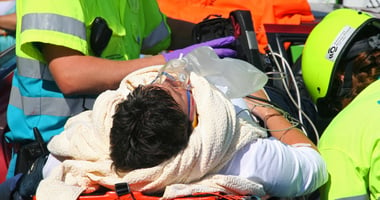Adolescents who have suffered a previous concussion have a three-fold greater risk of having a...
Early Signs of Post-TBI Aggression, Depression May Predict Long-Term Challenges
 |
“The implication of this is that critical assessment of aggression via evaluation of psychosocial and psychiatric disease burden in the early TBI period can allow for early interventions to potentially prevent progression of aggressive behavior later,” wrote lead author Durga Roy, M.D., of Johns Hopkins University School of Medicine and colleagues. Additionally, the “findings suggest that identification and treatment of depression within the first three months of TBI may reduce the burden of disease that ensues from aggression within the first year postinjury.”
For the study, Roy and colleagues assessed psychiatric symptoms and psychosocial functioning in 103 adults with first-time TBI over 12 months. Overall rates of aggression were 34.3% at three months, 41.1% at six months and 38.0% at 12 months. Verbal aggression was the predominant manifestation, while physical aggression (whether on self, others, or objects) was negligible.
Poor social functioning at three months was also found to be associated with aggression at 12 months. Post-TBI cognitive deficits, substance abuse, and frontal lobe injuries did not show any association with subsequent aggression, however.
“Future studies should focus on effective early screening for new-onset depression after TBI and early psychosocial interventions to improve psychosocial functioning,” the authors concluded.
To read more about this topic, see the Psychiatric News article “Sertraline May Help Prevent Depression Following Traumatic Brain Injury.”
(Image: decade3d/Shutterstock)





